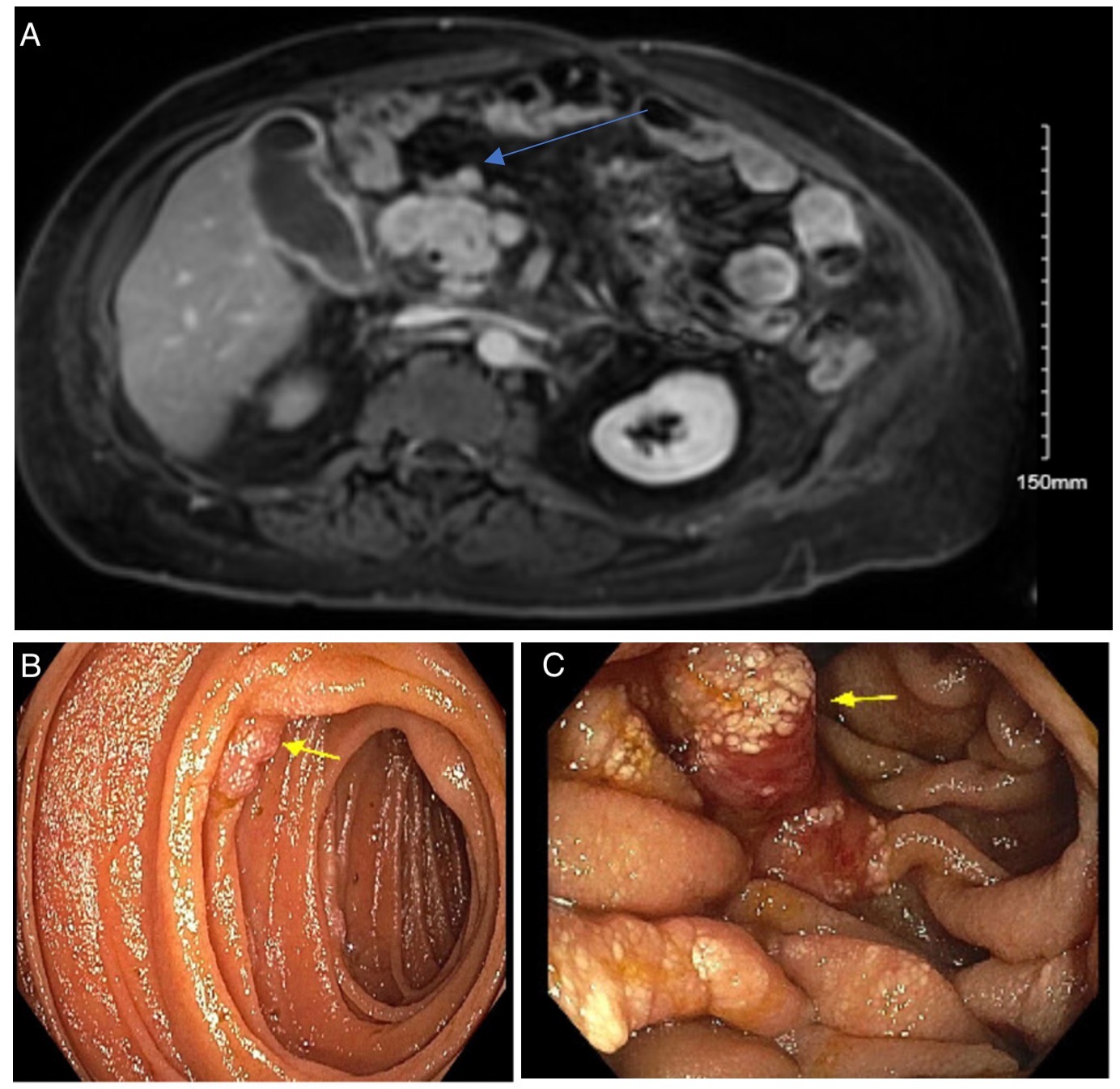Back


Poster Session C - Monday Afternoon
Category: Small Intestine
C0651 - An Atypical Case of Suspected Small Bowel Metastasis From a Gastric Primary Site
Monday, October 24, 2022
3:00 PM – 5:00 PM ET
Location: Crown Ballroom

Has Audio

Joshua D. Kirschenbaum, BS
NYU Grossman School of Medicine
New York, NY
Presenting Author(s)
Joshua D. Kirschenbaum, BS, Nicole B. Salvi, BA, Catherine C. Uy, MD, Renee L. Williams, MD, MHPE, FACG
NYU Grossman School of Medicine, New York, NY
Introduction: Small bowel neoplasms are significantly rarer in comparison to their colonic and gastric counterparts, with primary and secondary lesions accounting for a combined estimated 1-2% of all gastrointestinal malignancies. Primary lesions of the small bowel are most commonly adenocarcinomas, followed by small bowel neuroendocrine tumors, lymphomas, and sarcomas. Metastases to the small intestine may be associated with contiguous spread, lymphatic spread, extraluminal invasion in the setting of peritoneal carcinomatosis, or hematogenous spread often from melanoma, breast, or lung primaries. Given the infrequency with which small intestinal cancer is observed, such a diagnosis may easily be missed.
Case Description/Methods: We report on the case of a 68-year-old male with a history of gastric adenocarcinoma 2 years status post subtotal gastrectomy and extensive lymphadenectomy followed by adjuvant chemotherapy, who presented for evaluation after 1 episode of melena. Initial laboratory workup was notable for a hemoglobin of 7.8 g/dL. The patient had been admitted twice in the previous months with symptomatic anemia requiring multiple transfusions. MRI from these recent prior hospitalizations revealed regions of retroperitoneal lymphadenopathy with the most notable conglomerate measuring 4.0 x 1.3 cm anterior to the pancreatic head. Serial EGDs/push enteroscopies at that time revealed friability/bleeding at the gastrojejejunal anastomosis requiring clip placement. There were also several small flat hypopigmented nodules scattered in the efferent limb; biopsy from one of these sites returned positive for adenocarcinoma. Repeat push enteroscopy with biopsy was done. Anastomotic biopsies taken demonstrated only mild foveolar hyperplasia, while biopsies from 5 separate jejunal nodules were positive for poorly differentiated adenocarcinoma with extensive lymphovascular invasion.
Discussion: Metastatic small bowel cancer originating from a gastric primary site without evidence of either direct extension or peritoneal implants - as is seen in this patient - is a phenomenon not described in the current literature. Given the multifocality of this patient’s jejunal disease, the present working diagnosis is metastatic recurrence of known gastric adenocarcinoma. Follow up immunostaining is pending to confirm these suspicions and to rule out the presence of a primary multifocal small bowel malignant process.

Disclosures:
Joshua D. Kirschenbaum, BS, Nicole B. Salvi, BA, Catherine C. Uy, MD, Renee L. Williams, MD, MHPE, FACG. C0651 - An Atypical Case of Suspected Small Bowel Metastasis From a Gastric Primary Site, ACG 2022 Annual Scientific Meeting Abstracts. Charlotte, NC: American College of Gastroenterology.
NYU Grossman School of Medicine, New York, NY
Introduction: Small bowel neoplasms are significantly rarer in comparison to their colonic and gastric counterparts, with primary and secondary lesions accounting for a combined estimated 1-2% of all gastrointestinal malignancies. Primary lesions of the small bowel are most commonly adenocarcinomas, followed by small bowel neuroendocrine tumors, lymphomas, and sarcomas. Metastases to the small intestine may be associated with contiguous spread, lymphatic spread, extraluminal invasion in the setting of peritoneal carcinomatosis, or hematogenous spread often from melanoma, breast, or lung primaries. Given the infrequency with which small intestinal cancer is observed, such a diagnosis may easily be missed.
Case Description/Methods: We report on the case of a 68-year-old male with a history of gastric adenocarcinoma 2 years status post subtotal gastrectomy and extensive lymphadenectomy followed by adjuvant chemotherapy, who presented for evaluation after 1 episode of melena. Initial laboratory workup was notable for a hemoglobin of 7.8 g/dL. The patient had been admitted twice in the previous months with symptomatic anemia requiring multiple transfusions. MRI from these recent prior hospitalizations revealed regions of retroperitoneal lymphadenopathy with the most notable conglomerate measuring 4.0 x 1.3 cm anterior to the pancreatic head. Serial EGDs/push enteroscopies at that time revealed friability/bleeding at the gastrojejejunal anastomosis requiring clip placement. There were also several small flat hypopigmented nodules scattered in the efferent limb; biopsy from one of these sites returned positive for adenocarcinoma. Repeat push enteroscopy with biopsy was done. Anastomotic biopsies taken demonstrated only mild foveolar hyperplasia, while biopsies from 5 separate jejunal nodules were positive for poorly differentiated adenocarcinoma with extensive lymphovascular invasion.
Discussion: Metastatic small bowel cancer originating from a gastric primary site without evidence of either direct extension or peritoneal implants - as is seen in this patient - is a phenomenon not described in the current literature. Given the multifocality of this patient’s jejunal disease, the present working diagnosis is metastatic recurrence of known gastric adenocarcinoma. Follow up immunostaining is pending to confirm these suspicions and to rule out the presence of a primary multifocal small bowel malignant process.

Figure: A) Lymphadenopathy anterior to pancreatic head seen on MRI from a previous admission | B & C) Regions of jejunal nodularity visualized on push enteroscopy during most recent admission
Disclosures:
Joshua Kirschenbaum indicated no relevant financial relationships.
Nicole Salvi indicated no relevant financial relationships.
Catherine Uy indicated no relevant financial relationships.
Renee Williams: Boston Scientific – Stock-publicly held company(excluding mutual/index funds).
Joshua D. Kirschenbaum, BS, Nicole B. Salvi, BA, Catherine C. Uy, MD, Renee L. Williams, MD, MHPE, FACG. C0651 - An Atypical Case of Suspected Small Bowel Metastasis From a Gastric Primary Site, ACG 2022 Annual Scientific Meeting Abstracts. Charlotte, NC: American College of Gastroenterology.
